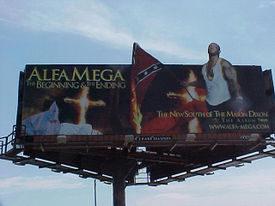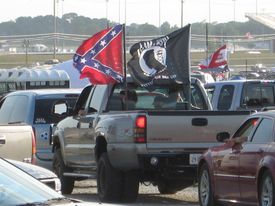Southern United States
The Southern United States, also known as The South, Dixie, the Bible Belt, PollenLand, and Jesusland, is a rural region of the United States. The South has developed its own distinct customs and cultural attainments, such as square dancing, banjo-strumming, moonshine, cotton, fried chicken, Coca-Cola, NASCAR racing, sunburnt necks, sweet-brewed iced tea, trailer parks, cow tipping, and cracking that whip.
The South is roughly identified as the eleven states that once formed the Confederacy: South Carolina, Mississippi, Florida, Alabama, Georgia, Louisiana, Texas, Virginia, Arkansas, Tennessee, and North Carolina. Later on, border state Missouri was booted out, and five other border states were arbitrarily lumped into the "Southern" definition (despite some having little in common with traditional southern culture): Delaware, Maryland, West Virginia, Kentucky, and Oklahoma, plus Washington, D.C. People from the Deep South may regard the "retroactive" Southern states as being, well, not so Southern, so context matters.
Although the South fought to secede from the Union during the American Civil War, today they are known as much any other region for their patriotism and commitment to morality in government. Depending on whom you ask, they might even be more patriotic and moral, due to their religion and devotion to traditional family values.
Geography and climate[edit | edit source]
Geographically, the South is a vast but utterly homogenous region, where homogenous marriage is forbidden and homogenous men are routinely referred to as quares. The South is flat, except where it is bumpy with mountains. Its main life forms are corn, cattle, and hogs. The capital of the South is Crawford, Texas, birthplace of U.S. President-for-life George W. Bush.
The South has numerous climatic zones, ranging from "hot" to "damned hot"; many crops grow easily in its soils, and so do the darkies to pick 'em. Some of the most vibrant parts of the South, particularly the dustbowl, have landscapes characterized by the presence of Bush's dry oil wells from his business career. Another common environment is the bayous and swampland of the Gulf Coast, home to crocodiles, the Ku Klux Klan, and other friendly critters.
God sends lots of tornadoes and hurricanes to the South to test the faith of believers and to smite sinners. Seriously, with all the wrath-of-God weather in Jesusland, you'd think the God-fearin' people there would ask themselves which sins they are committing to piss off The Big Guy.
Culture[edit | edit source]
Southern culture has been and remains generally more "old-timey" than that of the rest of the United States. Due to the central role of agriculture in the antebellum economy, Southerners did not learn to read and write until Southern schools acquired their first printing press in 1926. The South has also been known to be slightly behind the rest of the U.S. in terms of race relations; after the passage of Civil Rights laws in the 1960s, much of the Southern middle class still refused to "treat them darkies like people".
Southern communities have developed a strong attachment to preachers, superstition, and NASCAR racing as the primary community institutions. The intimacy of these communities provides for a comfortable atmosphere in which everyone knows what the other is doing. This is amplified by the laws of the land, in which anyone can get married (even relatives) if one gets the other pregnant.
The South has a varied cuisine, including grits, corn pone, corn on the cob, corn dogs, and corn burgers all washed down with high-fructose corn syrup soda and corn squeezin's (moonshine). Like the North with its affection for British tea, the South has a strong affection for its own brand, Texas tea. Like the British before them, the Southerners enjoy taking over sovereign nations in order to satisfy their demands for tea.
Demographics[edit | edit source]
The South, statistically, has the worst education numbers, worst development and infrastructure, the majority of the nation's poverty and the highest mortality rates (people have poorer health, obesity and die earlier)... which brings me to the point of Darwinism: weaker of the species die earlier. There is nothing exceptional nor contributory per GDP and GNP about any southern state... just racism, stupidity, bad health, bad hygiene, poorly educated, low iq, low income morons.
Most southerners actually believe in an invisible man in the sky and that the military "protects our freedom." His name is The Colonel. They take an ancient text way too seriously but find loopholes in the "thou shalt not kill" part of it and don't see any contradiction there. They complain about "big govmint" and then proudly sacrifice their lives to the military, which globally protects the wealth of rich northerners. This is what thinkin' people find most confusing about the South. AT&T is now SBC.
Southern women are known for their good cooking, good looks, and generosity. The South is a very practical part of the US, Southern womenfolks tend to be the hottest thing God ever put on two legs, and gee, ain't they PUUUURTY? Purrty fat? Any man should consider himself lucky to catch a Southern woman.
The United States Government along with the US Army whipped these hillbillies back into submission when they thought they could start their own nation... they didn't anticipate a stronger, wealthier North that sliced through them like a hot knife through weak, lazy, cowardly butter. God gave the South to the whites, who adopted the Bible as their constitution and grew lots of cotton and corn. In order to keep themselves pure in the sight of God, they are allowed to marry only their own cousins. Southerners also have a staggeringly high rate of methamphetamine use.
Southern people are very patriotic and still believe The South shall rise again.
Education[edit | edit source]
The South continues to lag behind the rest of the United States in terms of academics. Some of this has been attributed to poverty, but much of it is the result of a voting base who are unwilling to support public education. The only institution of higher learning in the entire South is the appropriately-named University of the South, formerly a ping-pong table with three extant legs.
The South is sometimes referred to as "Jesusland" by upper-class elitists, due to its slightly-behind-the-rest-of-the-U.S. educational standards.
Language[edit | edit source]
Southern American English is a dialect of pidgin cracker English spoken throughout the South. Southern American English can be divided into different sub-dialects, such as hillbilly, wigger, redneck, and gibberish. The dialect spoken by African Americans in the South, African American Vernacular English (AAVE), shares many similarities with Southern American English, only peppered with more slang and an ebonic flavor.
Greeting people in the South is quite simple really, just say hello and a good ole fashioned handshake just like yer daddy taught ya. Unlike the uncivilized North, with their pansified yankees with the delusions of superiority, they are the real part of the country that is doused in the failsauce. South=Elvis and most American music in general, North=Gay or something like it!
It is belived and accepted by most that peeple not from the South that Southerners have their own language. See below for examples.
"GIDDOF MAH LAYND Y'DAMN VARMINT!"
"Please remove youself from my property, govenment employee."
"YOU BEST NAWT BE WUN A THEM BLACK PEEPLEZ!"
"I certainly hope that you are not of the African-American community."
"GET ME MAH SHOOTY-GUN MARTHA!"
"Martha, would you please kindly hand me my hand-automated weapon?"
"GET ME SUM A DAT EATIN SHIT, WOMIN!"
"Excuse me my dear wife, but may I please have some food?"
"THIS BE FER SCREWIN UP MAH PLANTS!"
"This action was caused by you tampering with my garden."
"THEES HEER'S YER NEW WIFE BOI!"
"This is your sister"
"JEFF GORDON'S ONE A DEM QUEER-O-SEXUALS!"
"Jeff Gordon is an eloquent speaker, yet still talented at making left turns for three hours."
Politics[edit | edit source]
From the end of the Civil War to the 1960 election, the "Solid South", as political pundits called it, nearly always supported Democratic candidates. However, the Solid South began to break down with the 1964 election, when five southern states voted for Republican Barry Goldwater. The largest, and President Johnson's home state, Texas, remained Democratic. In 1968, Richard Nixon carried Florida and the Carolinas while an Independent, George Wallace, carried the rest except Texas.
Governor Wallace, commenting on his 1968 presidential bid, declared that by using a base of electoral votes in the Solid South and adding a few Northern and Midwestern industrial belt states, a candidate could accumulate enough electoral votes to win. Wallace did not win in 1968, but beginning in 1972, winning candidates Richard Nixon (1972), Jimmy Carter (1976), Ronald Reagan (1984), and George H.W. Bush (1988) carried every southern state. The exception to this was Reagan's election in 1980, when he carried every southern state except opponent Mr. Peanut's home state of Georgia.
Democratic candidate Bill Clinton reassembled Carter's coalition and carried Arkansas, Tennessee, Florida, West Virginia, and Georgia in 1992, but lost Georgia in 1996. George W. Bush (2000 and 2004) carried every Southern state including 2000 Democratic candidate and incumbent Vice President Al Gore's home state of Tennessee, which in an incredibly tight election probably cost Gore the presidency.
In 2008, there were new defections from the South back to the Democrats, as North Carolina, Florida, and Virginia went for Barack Obama, with the rest of the South going to John McCain. Both Florida and Virginia are now considered to be at least somewhat "purple" states; however, it should be noted that Florida demographically resembles Cuba more than a typical southern state, and Virginia has always been rather on the "edge" of the South geographically and politically, with many D.C. exurbs located in Northern VA being able to sway elections.
Military[edit | edit source]
Large numbers of southerners have served in the U.S. military. During the Civil War, southerners did not volunteer in large enough numbers to match the military needs of the South. Approximately twenty percent of all Confederate soldiers were therefore draftees (compared to eight percent in the Union armies), and they were subject to "compulsory reenlistment".
The current southern military has crisp, white uniforms with pointed hats.
Economy[edit | edit source]
The South has a diverse economy, based on the Reaganomic principle. Its main exports are corn, religious zealots, and cowboy hats, while its main natural resources are corn, cattle, and hogs.





